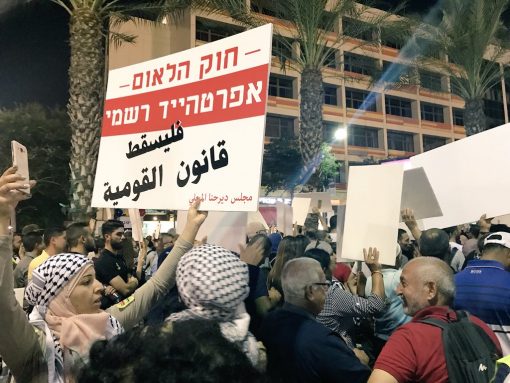
Passed last month, the law officially declared Israel as the nation state of the Jewish people and, among other things, made Hebrew the singular national language. The move was appladued by Israel’s right-wing government, which praised it as finally affirming the “Jewish character” of Israel.
Critics, local and international, however, have criticized the law, saying it turned Israel’s nearly 2 million non-Jewish citizens — both Palestinians and other minorities — into second-class citizens, by prioritizing Israel as a Jewish state over a democratic one.
About 30,000 protesters gathered in the Rabin Square in Tel Aviv and marched through the streets of the city towards the Tel Aviv Museum of Art, where the main rally, entitled “Abolish Nation-state Law – Yes to Equality,” took place.
Protesters called for the cancellation of the law and held signs calling on people to fight against apartheid.
Many activists and journalists tweeting about the protests commented that it was possibly the largest display of protests and solidarity between Israelis and Palestinians in Israel’s history.
Photos of the massive crowds showed people flying Israeli, Palestinian, and Druze flags, despite several reports saying that the protest organizers — The Arab Higher Monitoring Committee — specifically requested that flags not be flown, seemingly to appease liberal Zionists who threatened to boycott the protest if Palestinian flags were featured.
Nevertheless, many of the demonstrators waved Palestinian flags, while some chanted popular national slogans, including “With spirit, with blood we shall redeem you, Palestine!”
On his personal Twitter account, Israeli Prime Minister Benjamin Netanyahu tweeted a video of said protesters, saying “There is no better evidence of the necessity of the nationality law.”
Jafar Farah, Director of the Mossawa Advocacy Center for Palestinian Arab citizens in Israel, who was at the protest, told Mondoweiss that the show of Palestinian symbols at the protest was “extremely powerful.”

Jafir Farah at march in Tel Aviv against nation state law. Photo by Yumna Patel
“To take our Palestinian flag and symbols to Tel Aviv and tell the Jewish population what we think of this legislation, and to tell them that we will not accept second class citizenship, it was a powerful feeling,” Farah said.
“It was the first time that the Palestinian community moved in buses from our towns and villages to the middle of a Jewish center, Tel Aviv, to challenge the public discourse in Israel,” he told Mondoweiss.
When asked about Netanyahu’s and the Israeli response to the Palestinian flags and chants at the march, Farah said he was happy that it got the attention of the PM.
“The fact that Bibi was talking about it is a success in itself,” he said, highlighting the importance of creating a discourse in Israeli society, and getting Israelis to talk about and acknowledge Palestinian symbols, heritage, and history.
“We came with the Palestinian flag to say we are Palestinians, this country is our country, and if you like it or not, the future of this country will take into consideration that Palestine is not only about the occupied territories.”
Farah stressed to Mondoweiss that the symbols of the state is one of the core issues outlined in the Nation State law, which say that the state’s symbols are the Israeli flag, and that the name of the state will be called Israel, and nothing else.
https://www.facebook.com/Activestills/videos/10155513415457073/
“The marginalisation of the Palestinian community, which has been happening since 1948, is also taking place through this designation of the symbols of the state,” Farah said, when asked why it was so important for Palestinians to raise their flags and wear kuffiyehs at the march.
“What we can offer to the Jewish population is peace based on reconciliation and truth, not peace based on separation,” Farah told Mondoweiss.
“The peace that has been offered to us has excluded and separated us. This is not peace. We are here, we are Palestinians, and we are not planning to go away.




